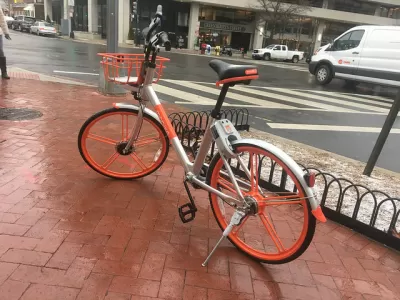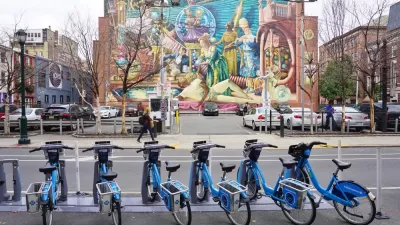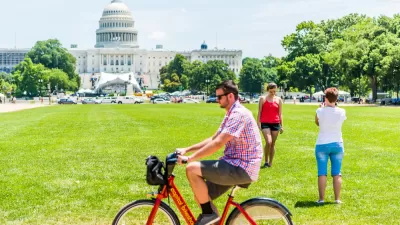Dockless bikes offer the unexpected and help users navigate and understand the urban environment in new and different ways.

In an excerpt from the new book The Urban Improvise: Improvisation-Based Design for Hybrid Cities, Kristian Kloeckl reflects on the role of dockless bike systems as part of the urban landscape. He looks at the changes in bikeshare program from Amsterdam’s White Bicycle Plan in the 1960s to today’s digital and highly connected networks.
Dockless bikes offer the openness and freedom to make new and more spontaneous travel decisions, says Kloeckl. "When you see a bike in plain sight or virtually on a digital map, you walk up to it, unlock it with your smartphone, and start riding it, to then leave it parked at any spot. It is a strength of the system that it is so inviting and easily accessible; people come up with new ways of integrating these bikes into their daily routines that they themselves did not consider before."
Dockless bikesharing is not without its issues — missing and abandoned bikes or bikes left outside of the system’s boundaries, for example. But this uncertainty is also what fuels the possibilities, argues Kloeckl.
"The dockless bike-sharing system is in constant flux. Bikes are parked in different locations all the time, and the system, in this way, is capable of adapting to changing conditions of traffic, housing, residency, and so on. Precisely because there are no predetermined docking stations, the parked bike locations remain relevant in the context of constantly changing urban conditions, as the locations are an expression of actual use," adds Kloeckl.
FULL STORY: Embracing the Improvisation of Dockless Bike-Share

Alabama: Trump Terminates Settlements for Black Communities Harmed By Raw Sewage
Trump deemed the landmark civil rights agreement “illegal DEI and environmental justice policy.”

Study: Maui’s Plan to Convert Vacation Rentals to Long-Term Housing Could Cause Nearly $1 Billion Economic Loss
The plan would reduce visitor accommodation by 25% resulting in 1,900 jobs lost.

Planetizen Federal Action Tracker
A weekly monitor of how Trump’s orders and actions are impacting planners and planning in America.

Waymo Gets Permission to Map SF’s Market Street
If allowed to operate on the traffic-restricted street, Waymo’s autonomous taxis would have a leg up over ride-hailing competitors — and counter the city’s efforts to grow bike and pedestrian on the thoroughfare.

Parklet Symposium Highlights the Success of Shared Spaces
Parklets got a boost during the Covid-19 pandemic, when the concept was translated to outdoor dining programs that offered restaurants a lifeline during the shutdown.

Federal Homelessness Agency Places Entire Staff on Leave
The U.S. Interagency Council on Homelessness is the only federal agency dedicated to preventing and ending homelessness.
Urban Design for Planners 1: Software Tools
This six-course series explores essential urban design concepts using open source software and equips planners with the tools they need to participate fully in the urban design process.
Planning for Universal Design
Learn the tools for implementing Universal Design in planning regulations.
Caltrans
Smith Gee Studio
Institute for Housing and Urban Development Studies (IHS)
City of Grandview
Harvard GSD Executive Education
Toledo-Lucas County Plan Commissions
Salt Lake City
NYU Wagner Graduate School of Public Service




























